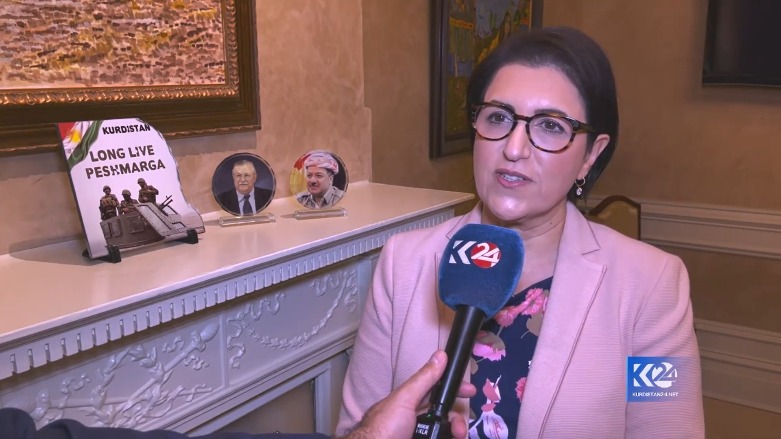Peshmerga Ministry delegation visits Washington, demonstrating US commitment

WASHINGTON DC (Kurdistan 24) – A delegation from the Ministry of Peshmerga Affairs recently visited Washington DC for a brief period of study at the National Defense University (NDU.)
The military educational institution, which lies across the Potomac River from the Pentagon, is run by the Department of Defense, and the week-long program was conducted under the auspices of NDU’s Near East South Asia Center for Strategic Studies (NESA.)
As NESA’s website explains, the Center is “the preeminent US Department of Defense institution for promoting security cooperation with partner countries in the NESA region”—which extends “from North Africa across the Arabian Peninsula and into South Asia.”
The NESA Center was established in 2000—just before the September 11, 2001, attacks on New York and Washington that triggered the US war on terror—which has proven to be America’s biggest military intervention in its history in the NESA region.
“The NESA Center works to enhance security cooperation between the US and the Near East and South Asia by providing a collaborative space for policymakers to build security strategy and cultivate partnerships,” the Center’s website states.
The delegation from the Ministry of Peshmerga Affairs was part of a larger group from Iraq’s security agencies, as Bayan Sami Abdul Rahman, the Kurdistan Regional Government (KRG) Representative in Washington, explained to Kurdistan 24.
The Kurdish delegation was led by Sarbast Lazgin, Deputy Minister of Peshmerga Affairs, and included Maj. Gen. Bakhtyar Mohammed, Advisor at the Ministry, as well as Brig. Gen. Hoshmand Haidar, the Deputy Chief of Staff at the Ministry.
The course at NESA was originally scheduled for last year. However, it was postponed because of the COVID-19 pandemic, Abdul Rahman said, and this was the first time that a Ministry of Peshmerga Affairs delegation was included in a NESA program for Iraq.
The significance of the event is underscored by NESA’s description of its purpose: “providing a collaborative space for policymakers to build security strategy and cultivate partnerships.”
That allows for US officials, even those who have never been to Erbil, to develop ties and understandings with the Kurdish military leadership and vice-versa.
Such mutual comprehension facilitates the development of policies that benefit both parties.
“This program was about strategic thinking, about cooperation,” Abdul Rahman said, and that “illustrates why it was important that this delegation was here.”
US Remains Committed to Kurdistan and Iraq
The Kurdish envoy also noted that the seminar took place soon after the US withdrawal from Afghanistan, which she described as “not the way Americans had envisaged it.”
“It was chaotic and it was hurried,” precipitating “a lot of debate,” in the US, she added. And in Iraq and Kurdistan, “it began a debate on whether the United States wanted to withdraw from there as well.”
But including senior officials from the Ministry of Peshmerga Affairs in the visit “illustrates that as far as America is concerned, the relationship with Iraq and Kurdistan continues,” she stated. “And I think this is what the delegation themselves were told, while they were here.”
US officials have repeatedly affirmed that commitment—from President Joe Biden on down. Last week, Biden met Iraqi President Barham Salih on the sidelines of the opening of the UN General Assembly in New York.
“Biden stressed the US commitment to Iraq’s long-term stability,” according to a White House readout of their meeting. The two leaders also “reaffirmed their respect for Iraq’s democracy, rule of law, and efforts to hold credible and transparent elections this October.”
Read More: US, Iraqi presidents meet at UN General Assembly; Biden affirms US commitment to Iraq
A month before that, in a telephone conversation between Jake Sullivan, Biden’s National Security Adviser, and Iraqi Foreign Minister, Fuad Hussein, “Sullivan conveyed President Biden’s strong commitment to Iraq and to its people and to further strengthening our enduring bilateral relationship under the Strategic Framework Agreement,” according to a statement from Emily Horne, a spokesperson for the National Security Council (NSC.)
Read More: White House affirms Biden’s ‘strong commitment to Iraq’
In addition, as the KRG Representative told Kurdistan 24, “I had a meeting yesterday with Dana Stroul,” the Defense Department’s Deputy Assistant Secretary for the Middle East, “and we discussed many things,” including “the US-Iraq, US-Kurdistan relationship, especially in light of what’s happened in Afghanistan.”
Stroul “was very confident and very reassuring in saying that the United States has plans to stay in Iraq,” at “the invitation of the Iraqi government and to change the nature of the forces in Iraq from a combat to a non-combat role,” Abdul Rahman continued.
“With that, the United States is very firmly determined to stay in the country and sees Kurdistan and the Peshmerga as a strategic partner,” the Kurdish envoy concluded.
Indeed, “strategic partner” or “strategic partnership” as a phrase used by US officials to describe their relationship with the Kurdistan Region was first introduced last April by the Biden administration into the US lexicon, when Stroul, along with Brett McGurk, NSC Coordinator for the Middle East and North Africa, spoke in a KRG-sponsored webinar marking the 30th anniversary of Operation Provide Comfort.
Read More: Biden administration: We have a ‘strategic partnership’ with the Kurdistan Region
Both officials spoke of America’s “strategic partnership” with the Kurdistan Region. As Kurdistan 24 noted, the repeated articulation of that term by two currently serving US officials, suggests its use was deliberate.
Strategic partnership suggests that the warm US relationship with the Kurdistan Region that now exists is not tactical: something temporary and subject to change with the winds of erratic and passing circumstances. Instead, it is a strategic relationship, overarching and long-term, as Stroul, again, made clear in her meeting with Abdul Rahman.